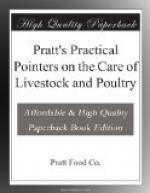Sitting hens are very satisfactory if properly handled. Use only quiet, motherly sitters and place them where they will not be troubled by the rest of the flock. Feed whole grain and a little green food and supply plenty of water.
Dust the sitting hens occasionally with Pratts Powdered Lice Killer so they won’t hatch a brood of lice with the chicks. And paint the nest boxes with Pratts Red Mite Special to keep the blood-thirsty mites away.
Growing the Chicks
Little chicks must be attended to no matter what else is done, because lack of intelligent care in early life will be reflected in poor performance when the chicks reach maturity. One can seldom, if ever, offset the mistakes of brooding time by the best of attention later on.
Protect your chicks against the weather, against their various enemies, against diseases, against lice and mites. Keep them comfortable and happy. Start them right, keep them growing steadily until they attain their full size.
Protection against unfavorable weather conditions—rain, cold winds, blazing sun—is secured by providing well-built coops and natural or artificial shade. Coops should be weather-proof, but well ventilated, and so located that surface water from sudden showers cannot flood their floors. They should also be sufficiently roomy to keep the flock happy during long hours of confinement in periods of stormy weather.
Chick enemies include those that do their work in the coops, usually at night, as rats, weasels and skunks, and those that prey upon the flock when it is at liberty, as cats, dogs, crows and hawks.
Protection against the former is found in proper construction of the coops, which should have tight floors and fine wire netting over openings left open at night. A good dog will discourage these night prowlers and steel traps placed at strategic points will often put a quick end to their activities.
Protection against ordinary diseases lies in keeping the little birds strong and vigorous through proper feeding, exercise, etc., and by close attention to sanitation. Keep the quarters and food and water dishes clean. Use Pratts Poultry Disinfectant at frequent intervals.
[Illustration: A-SHAPED COOP]
Aim to prevent rather than cure disease. Should there be any evidence of bowel trouble, give Pratts White Diarrhoea Remedy in the drinking water. Don’t let the condition become chronic or general. In “sour weather,” when colds may be expected to appear, use Pratts Roup Remedy in the drinking water.
Lice and mites work practically unseen, but they are the source of heavy loss, both directly and indirectly. In extreme cases they actually kill many chicks.




